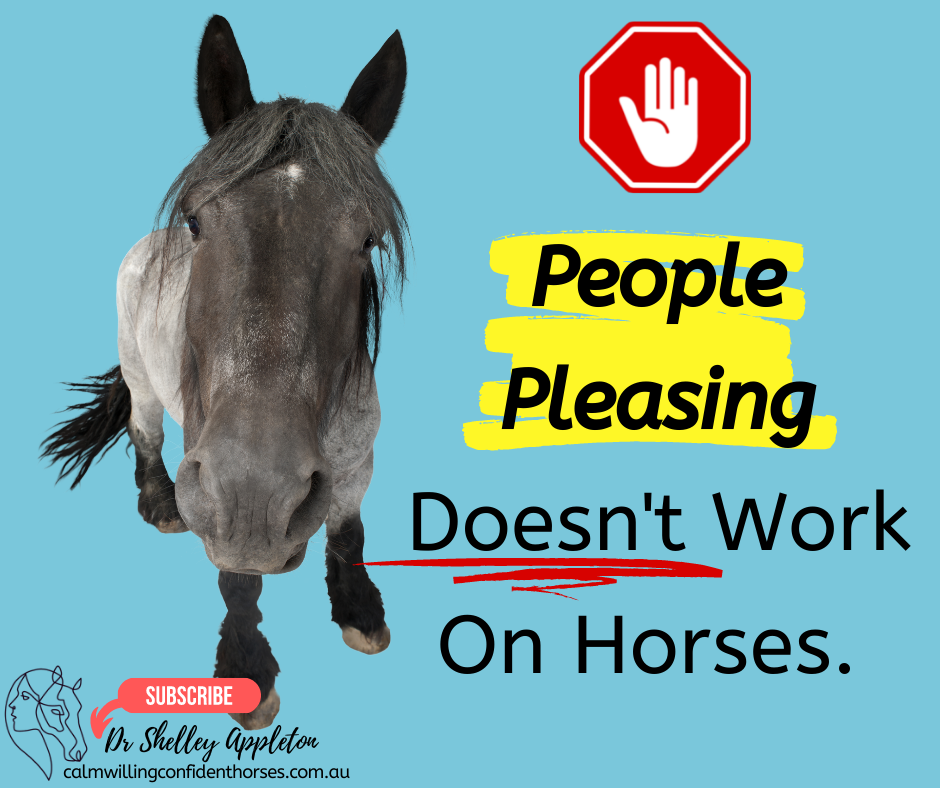People Pleasing will make you struggle with horses
People Pleasing Tendencies Will Make You Struggle With Horses
“People pleasing” is when you change your words and behaviours for the sake of another feelings or reactions. You say “yes” to things you don’t really want to do. You bend and shape yourself into whatever is most convenient to other people around them. You give, you serve, you sacrifice. In your mind you see yourself as kind and compassionate to others…but guess what…you actually aren’t.
People pleasing is a defensive coping strategy used to protect yourself.
To protect YOU from rejection and danger.
If you are a people pleaser you tend to be hyper-vigilant to the emotions of others. You do this because at some stages during your life (typically when you were very young) your mind made the connection that it was safer for you if you did what other people wanted. That your value as a person came from what you did for others. And you received love when you behaved to the approval of others. It is complex and all of us a degree of these beliefs hidden inside us.
So people pleasing is not about kindness and compassion. It is a defensive coping strategy, a way you handle stress and it messes with your ability to form relationships.
In relationships with people it can make you an easy target for being used and abused. However, it can also make you manipulative, dishonest and frustrating as you try to make everyone happy and stretch yourself thin while being prone to resentment and secretive behaviour. Being kind and compassionate to people is not doing things to make them happy or to keep their affection. Being kind and compassionate is actually having strong boundaries, and can involve saying things that people might not want to hear and getting people to take responsibility for their situations.
So, how does this people pleaser tendency cause issues with your horse?
It causes MAJOR issues. Whilst people pleasing behaviours on people will work to a degree but it just DOESN’T work with horses.
WHY? BECAUSE THEY ARE HORSES!
You cannot manipulate horses with words, like you can people.
Actions that make people happy will be interpreted completed differently by a horse.
You can’t hug a horse to comfort it or try to reassure it with kind words when they want to get back to their paddock mate.
Finally, horses are way better at detecting that when you are engaging in people pleasing behaviours you are actually scared and that bothers them a lot! If you are not confident, they are cannot be confident.
Because people pleasing occurs when you become stressed, this typically happens when a horse displays some level of negative emotion or resistance. Because people pleasers are hyper-vigilant to negative emotions in others this can trigger you to express people pleasing behaviours.
Some examples of people pleasing behaviours include:
Buying into what the horse is worried about and trying to fix the worry to make the horse happy. Therefore you avoid things that you think will worry the horse and get very focused on trying to control the environment around the horse.
When a horse displays any level of worry, you stop, step back, remove pressure. You therefore end up teaching and reinforcing behaviours and emotions in the horse by accident.
You avoid upsetting the horse because you are worried the horse might not like you or become scary and you wont be able to handle them. Again, you end up reinforcing behaviours or avoiding discouraging negative behaviours. Therefore, the horse can become difficult to handle and work with.
You start trying to make the horse happy. It is happy eating treats so you feed lots of carrots and treats. At best this can act as a bandaid or distraction; however, it can also reinforce difficult or negative behaviours by accident.
A combination of fear, frustration and resentment towards the horse can make you prone to lash out at the horse in difficult situations.
If you are a people pleaser you have to identify you are doing this and stop.
To be good with horses you have to discover the barriers within you that can hamper you being who and what you need to be in order to help and support horses. Horse’s need to learn to regulate their stress, navigate the world and feel secure with you. Horse’s need to learn how to accept change in their environment, follow where you guide them, be safe and compliant to work with and look to you for support.
Forming a partnership with a horse will involve moments of conflict and stress as they learn and process environments and situations. You need to learn the skills necessary to be able to see their distress or concern and take action that helps them learn to respond, cope, adapt, accept and feel secure - not action that just avoids your own discomfort.
You have to heal that part of you.
